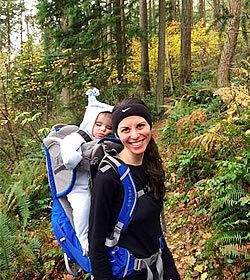Award Supports Exploration of Parents' PTSD Effects on Children
 |
| Photo: Alissa Jerud |
The Elizabeth Munsterberg Koppitz Child Psychology Graduate Student Fellowship is an opportunity available from the American Psychological Association. The purpose of the award is to support graduate research projects relating to child psychology. Only one student can be nominated per institution and our nominee, Alissa Jerud (Adult Clinical with Lori Zoellner) last year was selected to receive a $25,000 award! We asked Alissa a few questions about herself and her plans for this support.
Let's start with the basics, where are you from and where did you complete undergrad/masters?
I'm from Columbus, Ohio and I completed my undergrad at Cornell University.
How did you wind up at UW/why did you apply here? What do you think about living in Seattle?
I ended up at UW because I was really excited to work with my advisor, Lori Zoellner, given our shared research interests in PTSD. I love Seattle and think that it is one of the most beautiful places in the country, even in spite of the rain.
What is your research interest and how did you get into it (what inspires/motivates you)?
My research interests are in understanding how parental posttraumatic stress disorder (PTSD) affects children and in optimizing treatment outcomes for individuals with PTSD. I first became interested in studying PTSD in college when I was working on a crisis hotline for survivors of domestic violence and sexual assault. Many of the individuals with whom I spoke had suffered from PTSD symptoms for years, never having received evidenced-based treatment for their trauma-related difficulties. Thus, I found myself desperately wanting to learn about effective treatments for PTSD. Upon graduating from college, I worked as a research assistant on a treatment trial for adolescents with PTSD. There, I found in a small sub-study that I conducted that the adolescents' PTSD symptoms were highly correlated with their parents' symptoms. Thus, I began to wonder how parental PTSD might affect children.
How did you learn about your funding opportunity and tell us about the application/waiting process?
I learned about the Koppitz Fellowship from Jeanny's weekly emails. I applied for the fellowship in mid-November and found out that I had received the award in March or April.
How did you feel when you learned that your application was accepted and that you will receive funding?
Having previously submitted five other grant applications, none of which had been successful, I was absolutely shocked and ecstatic when I came home one day to find the award letter in my mailbox.
Do you have any advice/tips/suggestions for others who may apply to this opportunity? About graduate study in general?
I don't have any tips for this award in particular, but I would suggest applying for as many grants as possible. Doing so requires that you have a thick skin, but hopefully the persistence will pay off in the end.
What do you hope to accomplish with the funding and/or while in the UW Psychology graduate program?
I am testing the hypothesis that parental PTSD is related with impairments in child safety signal learning, defined as the ability to distinguish between threat and safety cues. Unfortunately, recruitment has been going slowly recently, so the main thing that I am now hoping to accomplish is simply to recruit my promised 68 parent-child dyads before beginning my clinical internship in the summer.
What do you like doing in your spare time?
Play with my 20-month-old daughter, hike, and do yoga.
The last book and/or movie you saw and enjoyed?
Sadly, I can't remember the last book I read or movie I saw, but my husband and I do watch the Big Bang Theory and Downton Abby, and I love both of those shows!
What you plan to do once you complete your PhD?
I'm not entirely sure yet, but ideally I will go into an academic setting where I can do a mix of clinical work, research, and teaching.
Supplemental Reading:
- Elizabeth Munsterberg Koppitz Child Psychology Graduate Student Fellowship. Students who are interested in this award should contact their department grants officer for the application process due to the limited nomination spots.
- Grants and Funding Information Service (GFIS) through the UW Libraries.

